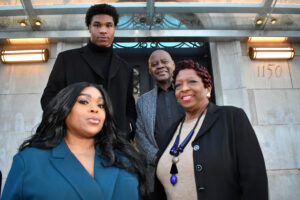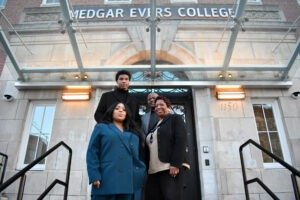A family legacy: ‘Going to Medgar Evers College showed I could do anything I wanted to do’

By David Gil de Rubio | dgilderubio@mec.cuny.edu
Not unlike the classic Sly Stone song “Family Affair,” Medgar Evers College has played a similar role in the life of Dr. Gail Reed-Barnett (Class of 1990). In addition to earning a Bachelor’s degree in Psychology, she counts husband Winston A. Barrett (Class of 2000) and daughter Tameka S. Harrison-Harris (Class of 1998) as Medgar Evers College graduates.
Keeping the familial thread going, grandson Christian Alexander Essen Moran is wrapping up his sophomore year while pursuing a degree in Liberal Arts.
The daughter of two civil servants, the late William and Lillian Reed, who both retired from the City of New York (MTA/Board of Education), Dr. Reed-Barnett’s impressive career path was possible because Medgar Evers College served as a springboard to success.
“I started at Brooklyn College, where I was on the Dean’s List for two years as a psychology major,” she recalled. “My math skills weren’t that great, but I excelled in the classes I needed to take. I ended up flunking out of Brooklyn College because my math skills weren’t that great. They put me on academic probation and I could only take one class. I was like, ‘No. I’ll never get out of school.’
“I was at the First Baptist Church of Crown Heights and Dr. Chung was the president at that time. He was there at our church giving a sermon and afterwards we talked about Medgar Evers College. I thought what he said was interesting, thought about it and took my transcript that had 60 credits to Medgar Evers College. I will tell anyone this and this is a quote — ‘That was where I learned how to be a successful Black woman living in Brooklyn.’”

The oldest of four children, Dr. Reed-Barnett grew up on Hart Street in Bedford-Stuyvesant and later moved to Flatbush before graduating from Samuel J. Tilden High School in 1973, where future New York Yankees shortstop Willie Randolph was a classmate. A bride at 17 and mother at 18, the future New York City School Counselor/College Advisor eventually became a single mother after her first marriage dissolved. Bouncing between a number of temp jobs, Dr. Reed-Barnett had a five-year stint on welfare before higher education provided a foothold for her.
It would be Medgar Evers College that provided a greater window to the world for this survivor.
“I can’t tell you the education I received just about life beyond studying,” she said. “I learned about apartheid. I was walking through the halls of Medgar Evers College and I heard people talk about apartheid. I wasn’t going to ask because I didn’t want people to know that I didn’t know what it was.
“I learned about it in terms of South Africa. It was deep. I guess it was part of the fact that I was raising my daughter and putting more interest in her instead of taking in world news. I knew it existed — don’t get me wrong. I didn’t pay attention to it that much until I was around students at Medgar Evers College and what they were doing.”
She added, “I thought it was really fantastic. Then I joined the Association of Black Psychologists and I learned more. I liked the people and it was very instrumental in my education to get me where I am today. I have no fear. I just keep going and going and going.”

This kind of mind-expanding experience is something her daughter lived through as a self-described “Medgar baby,” who was often in tow and in class with her mom. These are memories she doesn’t take lightly even as her own son is part of the current Medgar Evers College student body.
“Knowing that Medgar Evers College is not only a place for students, but for students with children meant the world to me,” Harrison-Harris said. “Once I graduated high school, I knew I wanted to be a force to reckon with. I am who I am today because of Medgar Evers College.
“Medgar Evers College taught me a lot about what it is to be an amazing Black woman from my history classes to my psychology classes. I graduated with a Bachelor’s in Psychology. I’m proud to be a graduate of Medgar Evers College. As a child going to the classroom with my mom, that was an experience that always spoke volumes. It provided me with a foundation rooted in greatness.”
Ask Dr. Reed-Barnett about her time at Medgar Evers College and she’ll beam as she talks about the warmth of the professors and the overwhelming sense of support and community she felt.
Further buttressing it all were the elements of history she gleaned from an institution with social justice in its DNA.
“I guess because I couldn’t go to an HBCU school, Medgar Evers College was equal to that by teaching a lot of history and how it relates to today,” she explained. “Marcus Garvey, Toussaint Louverture and, of course, Dr. King — all these people I learned about. There were other people that were instrumental in building this country and if you don’t know about them, you just think you woke up one day and it was built.
“There’s a lot of history there. I even met Dr. [Betty] Shabazz. I had a conversation with her and my daughter even met her. As I said before, Medgar Evers College was like an HBCU in Brooklyn.”
Following her three-decades-plus career as a New York City counselor/college advisor, Dr. Reed-Barnett didn’t go quietly into retirement. She became a published author (2021’s Reflections a Journey to Transformation), was President of the New York State School Counselors Association and served two terms as the New York State Committeewoman/District Leader for the 58th Democratic Assembly District.
But throughout all of her experiences, Medgar Evers College was always within arms-reach. She currently serves as vice president of the Medgar Evers College Alumni Association, for which her husband Winston serves as president, a role he proudly holds.
“When I was going here, there was a lot of Afrocentric modeling and teaching,” he said. “You leave from there with the identity of who you are and your expectation in the community. It’s one of my dreams to spread the culture, expand the name of Medgar Evers within the community and encourage people to know the college. It’s a good idea — to keep spreading the word and working with people in the community to expand the name of the family.”
Having had both his grandparents and mother receive a degree from Medgar Evers College was a strong incentive for Essen Moran to enroll, but the school’s legacy was just as much of a draw for him.
“Among the reasons I came to Medgar Evers College is Medgar’s strong commitment to social justice and community empowerment as well as the excellence it represents,” he said. “I also really appreciate the diversity and how the teachers, staff and students here are like a big family. It’s a very trusting environment. I expected it to be different and it’s like a change of environment that I’m kind of getting used to.”
In the end, the seismic impact Medgar Evers College had on Dr. Gail Reed-Barnett not only left a generational mark, but also gave Reed-Barnett validation through some really tough times.
“Going to Medgar Evers College showed I could do anything I wanted to do and be anything I wanted to be,” she said.
“It gave me confidence in myself. Even though I was living in New York, I was reminded of a lot of things that had been going on in the South during the Civil Rights Movement. I paid a lot of attention to that. I was trying to understand why people don’t like certain people. It earned me a place in society.”